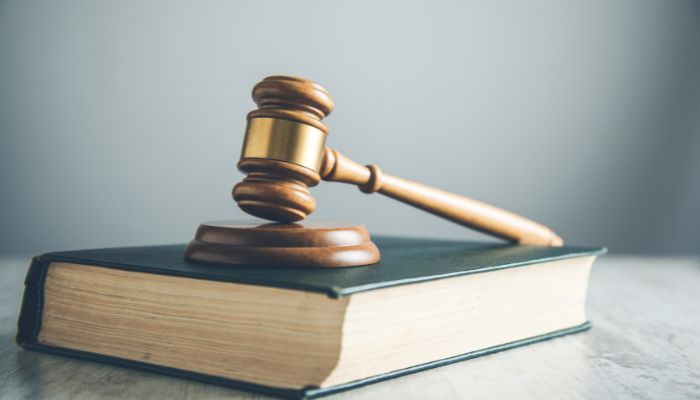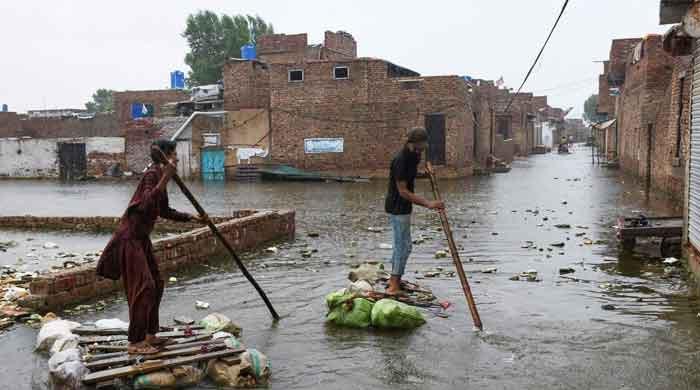Difference between constitution makers and interpreters
Judges, while interpreting any provisions of constitution should limit themselves to a fair reading of words of the constitution
July 14, 2022

In his dissenting note on the Supreme Court's short order interpreting Article 63A of the constitution, Justice Jamal Khan Mandokhail invokes the fundamental constitutional demarcation of the roles of the judiciary, parliament, and the executive: "The judges, while interpreting any provisions of the constitution should limit themselves to a fair reading of the words of the constitution and the intention of its framer, and no more. Otherwise, judges enter the realm of creating, not just interpreting the constitution."
Justice Mandokhail has drawn attention to a straightforward, simple, yet key difference between the role of constitution makers (parliamentarians) and constitution interpreters (judicature).
Even though it is a fundamental constitutional line, it has become increasingly blurred over time, threatening the robust functioning of the state as envisaged by our constitution. Exhibit A, recently, is the Supreme Court verdict on Article 63A and its impact on the unending and unsavoury saga of the election of the chief minister of Punjab.
Mr Hamza Shahbaz Sharif, MPA, was elected as chief minister of Punjab through a disorderly election in the Punjab Assembly on April 16. The election was marred by acts of violence perpetrated by Punjab MPAs owing to the failure of multiple layers of regulatory protection and checks because of negligence by the staff of the Assembly Secretariat. However, he was administered the oath of office only on April 30 by the Speaker of the National Assembly on orders of the Lahore High Court.
On May 17, interpreting Article 63A of the constitution, the Supreme Court gave a 3-5 majority verdict that votes cast by legislators in violation of their party’s stance must not be taken into account while determining the outcome of a motion. Terming the majority verdict as akin to amending the constitution, Justice Mazhar Alam Khan Miankhel and Justice Jamal Khan Mandokhail had recorded in their dissent that Article 63A of the constitution is a complete code in itself. A member of parliament is aware that casting a vote contrary to the parliamentary party’s direction results in the severe penalty of losing one’s seat. Nowhere in the constitution is it written that the vote of a member should be excluded from counting—which shows that it is not the intent of the legislature to put a bar on the fundamental right of casting a vote. In the presence of such a comprehensive procedure regarding the defection of a member of parliament, any further interpretation of Article 63A of the constitution would amount to rewriting the constitution.
Applying the majority verdict of the Supreme Court, the Lahore High Court, in a 4-1 verdict on June 30 on the appeals of the PTI filed against the election of the chief minister of Punjab, ordered a recount of votes on July 1 with the exclusion of the 25 defecting party members. However, overriding and amending the LHC verdict the next day, the Supreme Court ordered that the second poll for the election of the CM Punjab would be held at 4pm on July 22, four (4) days after the by-election scheduled to be held on July 17 on the vacant seats of Punjab MPAs on account of their defection.
Interestingly, the SC order was issued in response to a petition which had only sought amendment/modification of the LHC order to allow for the provision of adequate and sufficient time to hold a session of the Punjab Assembly. Even though the SC order said that the respondents had not argued against the decision of the Lahore High Court, it still gave a 10-page order.
Apart from amending the date of election of the chief minister of Punjab from July 1 to July 22, the SC order went on to further re-enunciate already-well-defined constitutional and legal provisions. Take for instance, the provisions of honest just and fair elections defined under Article 218-3 of the constitution. The Supreme Court chose to reiterate the same anyway when asking that the by-election be held in a free, fair, and transparent manner. The order further went on to re-emphasize Article 220 of the constitution when it asked for the ECP and state functionaries to ensure that all parties follow the election laws and refrain from any interference, inducement, or influence in the affairs of the executive, the local administration, and the ECP.
The SC order regurgitated another point, already well-defined in the law, that no transfers or postings of officials of the local administration, police, provincial Election Commission, etc, shall be undertaken during the by-election. Once the election schedule is announced till the official declaration of results in the official gazette, the Election Commission practically assumes the role of government, a fundamental change brought about through the Elections Act, 2017 (clause 5 (4)). The law enacted since October 2017 defines that after the announcement of the schedule of any election programme, the Election Commission has the sole authority on postings and transfers, and no government or authority can do so without prior written approval of the Election Commission.
The constitution of Pakistan is the supreme and fundamental law which clearly defines and demarcates the remit, duties, and powers of each branch of the state. This trichotomy of powers is the letter and intent of the constitution, which is crucial for effective democratic governance. The constitution clearly defines that no court shall have any jurisdiction other than what is defined by the constitution or law (Article 175 (2)). The judiciary, therefore, is a creature of the constitution and has to operate within the confines of the constitution and not to exercise power beyond that.
The decision of not counting votes cast by legislators in violation of their party’s stance is but bringing a fundamental change to Article 63A of the constitution. Quoting from Justice Mandokhail’s dissenting note again: "Judges have no authority to assume the role of the [sic] parliamentarians and to replace their wisdom by amending the constitution."
The writer is an analyst working in the fields of politics, democratic governance, legislative development, and the rule of law.











